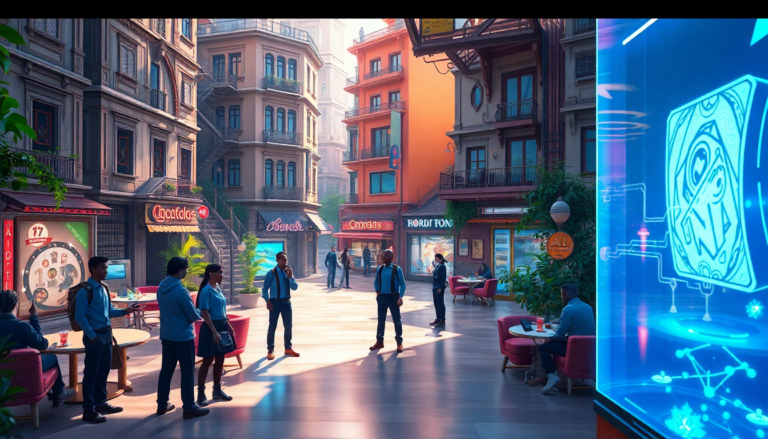Argomenti trattati
Imagine a gaming universe where characters exhibit behaviors and reactions akin to real-life individuals. This is the thrilling reality that artificial intelligence (AI) agents are introducing into the gaming world. These advanced systems are not only reshaping the roles of non-player characters (NPCs) but are significantly enhancing the overall gaming experience by making it more interactive and personalized.
The evolution of NPC behavior
Traditionally, NPCs in video games would follow rigid scripts, offering little more than pre-defined interactions. However, with the integration of AI agents, these characters are now capable of exhibiting lifelike behaviors that respond to player actions and choices. This transformation creates a more immersive environment where players feel their decisions have genuine consequences.
For instance, in expansive open-world games such as Red Dead Redemption 2, NPCs are programmed to remember previous encounters with players. This memory aspect allows for dynamic interactions, where characters react differently based on past experiences. Suddenly, the world feels alive, with NPCs evolving alongside the player’s journey.
Procedural content generation
One of the standout features of AI agents is their ability to generate vast amounts of content algorithmically. Games like No Man’s Sky showcase this technology, utilizing AI-driven procedural generation to craft entire universes filled with unique planets, creatures, and ecosystems. This innovation not only enhances replayability but also offers players nearly limitless exploration possibilities, ensuring that no two gaming experiences are ever the same.
This content generation process allows developers to create intricate worlds that seem to expand and evolve in real-time, making every player’s adventure distinct and personal. It’s a game-changer, literally and figuratively.
Dynamic difficulty adjustment
AI agents also excel in analyzing player performance and adjusting game difficulty dynamically. This ensures that players are always challenged without experiencing frustration. For example, in games like Resident Evil 4, the AI can subtly modify enemy behavior and item availability based on how a player is performing. This adaptability keeps the gameplay engaging and encourages players to improve their skills without feeling overwhelmed.
Moreover, this real-time adjustment helps maintain a healthy balance between challenge and enjoyment, allowing players of all skill levels to immerse themselves in the game.
AI algorithms are not just about improving NPC behavior; they also enhance how characters navigate complex environments. By employing sophisticated techniques, AI agents can create realistic movement patterns, making both NPCs and player-controlled units more adept in strategy games. This results in a smoother gameplay experience, where characters move and react in ways that feel authentic, rather than mechanical.
Imagine a strategic battle where your units adapt their formations on the fly, responding to the ever-changing battlefield. The level of realism and engagement this brings to the game is unparalleled.
The future of AI in gaming
As we look ahead, the potential applications of AI in gaming are vast and exciting. The continuous advancement in AI technology promises to blur the lines between virtual and reality even further, creating environments that are not only reactive but also proactive. Players might soon encounter NPCs that develop their own strategies and tactics, learning from players’ actions and adapting accordingly.
Moreover, the incorporation of enhanced contextual awareness will allow AI agents to understand their surroundings better. This means that NPCs will not just react to immediate player actions; they will also consider the broader context of their interactions. For example, a character might remember a player’s previous choices, influencing future dialogue and behavior. This level of depth in storytelling could revolutionize how narratives unfold in games.
Building relationships with AI characters
Memory systems in AI are evolving too. Future AI agents will possess sophisticated memory capabilities, allowing them to build long-term relationships with players. Picture a game where every interaction leaves a lasting impression, and NPCs evolve based on past encounters. This could lead to emotionally charged experiences, where players feel a genuine connection to the characters they interact with.
Such advancements suggest a world where gaming becomes not just about completing quests but about forming bonds with virtual characters, adding layers of depth to gameplay.
Natural interactions and conversations
Perhaps the most thrilling prospect is the potential for AI agents to engage in natural conversations with players. As natural language processing technology continues to advance, players may find themselves having organic dialogues with AI characters. The ability to negotiate, ask questions, and form emotional connections could redefine role-playing games, creating immersive experiences that feel incredibly lifelike.
This evolution in interaction will transform the way stories are told in games, blurring the lines between scripted content and player-driven narratives. Imagine being able to influence the storyline not just through choices but through genuine conversations with the characters.
As the gaming industry embraces these groundbreaking advancements, the future of gaming is bright and full of potential. AI agents are set to redefine our interactive experiences, crafting dynamic, responsive worlds that adapt to our choices and actions. The possibilities are endless, and as we navigate this new terrain, one thing is for certain: gaming is on the verge of an exhilarating transformation.

